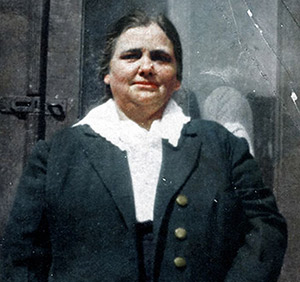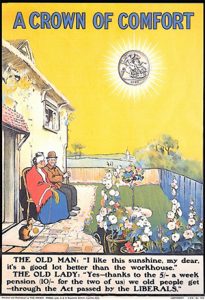January 01
Published in On this Day listing- 1871 The Irish Church Act (1869), whereby the Church of Ireland ceased to exist ‘as an establishment’, came into law.
- 1892

Above: Annie Moore, from Cobh, Co. Cork—the first person processed by the Ellis Island immigrant inspection station when it opened in 1892. (mediadrumworld.com)
Ellis Island, the US government’s busiest immigrant inspection station for over 60 years, officially opened. One can only speculate as to how Annie Moore (17) from Cobh, Co. Cork, came to be the first person processed. Newly arrived with her two brothers as steerage passengers on board the SS Nevada (her parents were already settled in New York), she was probably singled out by the authorities from amongst the jostling new arrivals because she was an English-speaking northern European who would present a more acceptable immigrant face for the assembled press corps. And so she was registered with much pomp and presented with a $10 gold piece by the island’s superintendent. It seemed, until recently, that Annie fared very well in the New World. It was believed that she migrated to Indiana and then to Texas, where she married a descendent of Daniel O’Connell and died in 1923 after being knocked down by a streetcar. It now seems, however, that there were two Annie Moores. According to recent genealogical evidence, the Texan Annie Moore—whose descendants regularly attended commemorations on Ellis Island and here in Ireland—was not an immigrant at all. She was born in Illinois. Our Annie had a much more mundane existence. Married to a German baker’s clerk, by whom she had eleven children, it seems that she spent her entire life in the Irish slums of Manhattan. Nevertheless, like her Texan namesake, her passing was somewhat out of the ordinary. Just 50 years of age, she was so obese at the time of her death that firemen had to remove her body through an upstairs window.
- 1919 HMS Iolaire, bringing sailors who had fought in the First World War to the Isle of Lewis in the Outer Hebrides, sank in the Minch strait. Over 200 of the 280 on board perished.
- 1974 The power-sharing Northern Ireland executive, under Chief Executive Brian Faulkner, took up office. Three days later Faulkner was forced to resign as leader of the Official Unionist Party when the Ulster Unionist Council rejected the establishment of a Council of Ireland under the terms of the Sunningdale Agreement.
- 1973 Ireland joined the European Economic Community (EEC) along with Denmark and the United Kingdom.
- 1968 Donagh MacDonagh (55), poet, dramatist and jurist, died.
- 1958 The European Economic Community (EEC), latterly the European Union (EU), came into operation.
- 1957 Seán South and Fergal O’Hanlon were killed during an IRA attack on Brookeborough RUC station, Co. Fermanagh.
 1909 Claimants to the state pension under the terms of the Old Age Pensions Act (1908) received their first payments at post offices throughout the country. Charged with awarding pensions to men and women aged 70 or over, the Local Government Board (1872) had to contend with the fact that the statutory registration of births had only begun in Ireland in 1864. Since the age of claimants could therefore not be proven one way or the other, they were obliged, in the words of the historian F.S.L. Lyons, ‘to grapple with the inexhaustible fertility shown by Irishmen of indeterminate age in inventing what they hoped would be valid claims’. One official ruefully described ‘the bent, decrepit attitude and the high quavering voice’ peculiar to applicants. A question famously put to them but soon discarded was ‘What do you remember about the Night of the Big Wind?’ (January 1839), in answer to which thousands recalled ‘eating a potato out of [their] hand’ on the night in question. In the event, successful Irish claimants far outnumbered those across the water in relative terms. And most qualified for the full rate of five shillings per week. The big day was widely reported in the national and local press. In rural Roscommon neighbours ferried ‘cartloads of aged female pensioners’ to the post office. A Monaghan pensioner showed his delight by waving his cap over his head and shouting ‘God save the King!’, whilst in Dublin’s Dame Street an elderly couple blessed ‘the postmistress, the government and the world in general’. Publicans remarked that business that day was as good as on a fair day.
1909 Claimants to the state pension under the terms of the Old Age Pensions Act (1908) received their first payments at post offices throughout the country. Charged with awarding pensions to men and women aged 70 or over, the Local Government Board (1872) had to contend with the fact that the statutory registration of births had only begun in Ireland in 1864. Since the age of claimants could therefore not be proven one way or the other, they were obliged, in the words of the historian F.S.L. Lyons, ‘to grapple with the inexhaustible fertility shown by Irishmen of indeterminate age in inventing what they hoped would be valid claims’. One official ruefully described ‘the bent, decrepit attitude and the high quavering voice’ peculiar to applicants. A question famously put to them but soon discarded was ‘What do you remember about the Night of the Big Wind?’ (January 1839), in answer to which thousands recalled ‘eating a potato out of [their] hand’ on the night in question. In the event, successful Irish claimants far outnumbered those across the water in relative terms. And most qualified for the full rate of five shillings per week. The big day was widely reported in the national and local press. In rural Roscommon neighbours ferried ‘cartloads of aged female pensioners’ to the post office. A Monaghan pensioner showed his delight by waving his cap over his head and shouting ‘God save the King!’, whilst in Dublin’s Dame Street an elderly couple blessed ‘the postmistress, the government and the world in general’. Publicans remarked that business that day was as good as on a fair day.- 1909 The first payments under the terms of the Liberal government’s Old Age Pensions Act (1908) were made to people over 70 years of age. Those with annual incomes of under £20 were awarded five shillings. Lesser amounts were paid, on a sliding scale, to those with annual incomes of up to £31 10s. In Ireland, the cost of claims ran to three times the government estimates.
- 1973 Ireland formally joined the European Economic Community (EEC), then often referred to as the Common Market, along with the United Kingdom and Denmark.
- 1974 The Northern Ireland power-sharing Executive took up office.
- 2019 Abortion services commenced in Ireland under the terms of the Health (Regulation of Termination of Pregnancy) Act (2018).
















